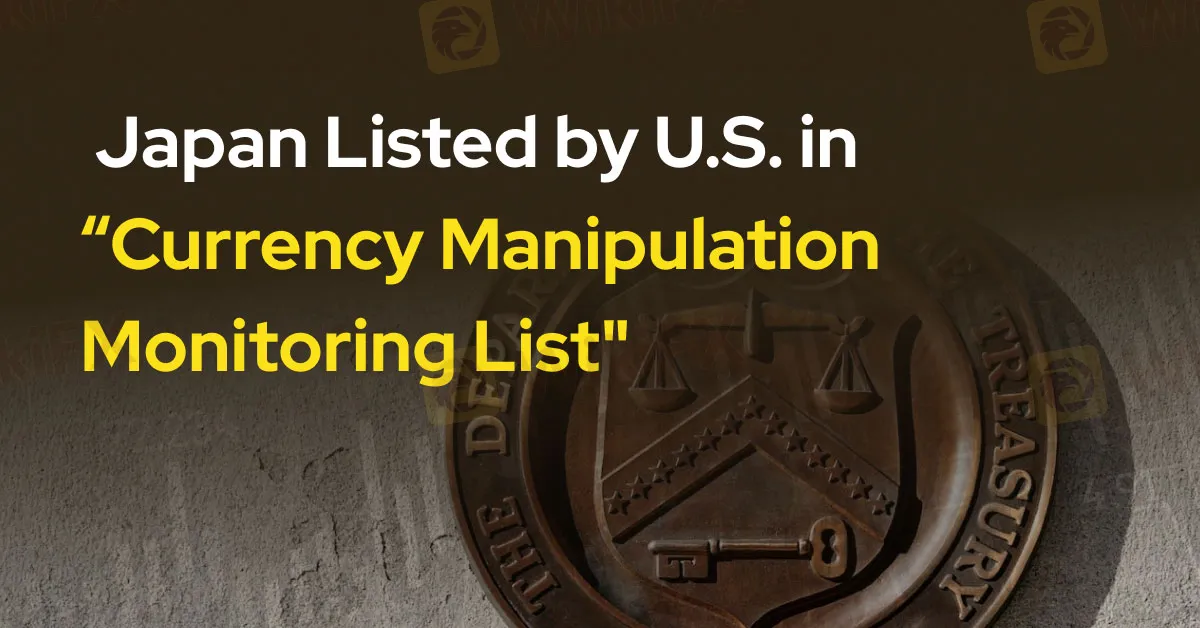简体中文
繁體中文
English
Pусский
日本語
ภาษาไทย
Tiếng Việt
Bahasa Indonesia
Español
हिन्दी
Filippiiniläinen
Français
Deutsch
Português
Türkçe
한국어
العربية
Japan Listed by U.S. in “Currency Manipulation Monitoring List"
Abstract:The U.S. Treasury Department said Thursday it has once again put Japan on a list of major trading partners that it monitors for potentially unfair foreign exchange practices. According to a June 21 report from Japan's Asahi Shimbun website, the U.S. Department of the Treasury announced on the 20th that Japan has once again been included in its "currency manipulation monitoring list."

The U.S. Treasury Department said Thursday it has once again put Japan on a list of major trading partners that it monitors for potentially unfair foreign exchange practices. According to a June 21 report from Japan's Asahi Shimbun website, the U.S. Department of the Treasury announced on the 20th that Japan has once again been included in its “currency manipulation monitoring list.” Analysts suggest that while the U.S. did not label Japan as a currency manipulator, placing it on the monitoring list serves as a warning. The United States, being the world's largest current account deficit country, closely scrutinizes countries and regions that accumulate significant trade surpluses with the U.S., suspecting deliberate currency depreciation to boost exports.
The U.S. Congress submits a report every six months on major trading partners' currency policies, and Japan has re-entered the monitoring list after a year. In 2023, Japan's trade surplus with the U.S. surged, with its current account surplus exceeding 3% of GDP, meeting the criteria set by the U.S. Treasury for inclusion in the monitoring list. Other countries and regions on the list include Germany, Malaysia, Singapore, Vietnam, mainland China, and Taiwan.
Japanese Finance Minister Taro Aso, speaking at a press conference after a Cabinet meeting on the 21st, commented on Japan being monitored again, stating, “This conclusion is based on mechanical evaluations by the U.S. regarding indicators such as the current account surplus and trade surplus with the U.S., and does not imply that the U.S. believes Japan's currency policy is problematic.”
Simultaneously, regarding Japan's interventions earlier this year to prevent a historic depreciation of the yen, the U.S. Treasury noted in its report, “Japan regularly discloses the results of its interventions, ensuring transparency.” Treasury officials interviewed on the 20th also expressed their view that Japan's currency policy is not problematic, describing Japan's interventions as counteracting competitive devaluation.

Disclaimer:
The views in this article only represent the author's personal views, and do not constitute investment advice on this platform. This platform does not guarantee the accuracy, completeness and timeliness of the information in the article, and will not be liable for any loss caused by the use of or reliance on the information in the article.
Read more

WikiFX Announcement: Suspension of Weekly Simulated Trading Competition
Since its launch in early 2023, the WikiFX Weekly Simulated Trading Competition has successfully hosted 99 consecutive rounds, attracting enthusiastic participation from traders worldwide and creating countless thrilling trading moments.

Retirement Savings Wiped Out: RM500,000 Lost to a Scammer named Richard Ong
A retiree was deceived into parting with more than RM500,000 after falling victim to an elaborate investment scam that promised substantial returns.

The Dark Side of Social Media Investments: How a Manager Lost RM2.08 Million
A Malaysian company manager suffered financial losses amounting to RM2.08 million after becoming the victim of an investment scam promoted through Facebook.

What Is the Role of Central Banks in Forex Trading?
Central bank policies shape market liquidity and interest rates, directly impacting exchange rate movements. Traders must closely monitor policy shifts.
WikiFX Broker
Latest News
Forex Market Outlook: Key Currency Pairs and Trading Strategies for March 24–28, 2025
Singapore Police Crack Down on Scams: $1.9M Seized, 25 Arrested
Gold Prices Swing Near Record Highs
XTB Opens New Dubai Office
Africa Cybercrime Bust: Over 300 Arrested in Fraud Crackdown
The Growing Threat of Fake Emails and Phishing Scams
Hong Kong Banks and Authorities Collaborate to Freeze Fraudulent Accounts Faster
SocialFi and the Forex Market: A New Era for Decentralized Social Trading?
Is Billion Bucks Fx Scam?
BaFin Halts USDe Token Issuance, Citing Serious Compliance Failures
Currency Calculator







